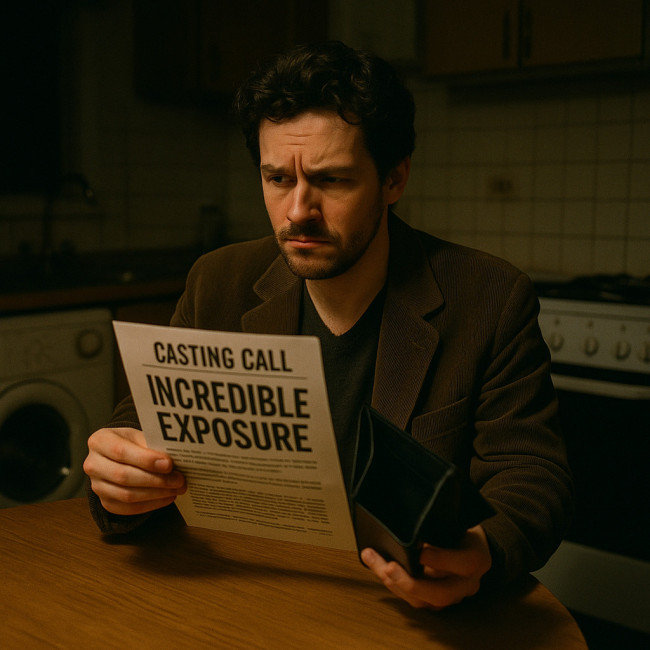Read casting calls critically and sidestep unpaid gigs disguised as exposure
Every week, thousands of performers answer casting calls promising “incredible exposure” yet deliver nothing but empty wallets and wasted hours. This guide teaches you how to analyse a brief like a pro, spot red flags in seconds, and negotiate fair pay so you only accept casting calls that truly advance your career.
Why “exposure-only” casting calls still flood the market

Despite growing awareness, unpaid casting calls dominate online job boards and social groups. Production teams justify them by claiming tight budgets, promising future work, or dangling festival laurels. Actors eager for credits often accept, hoping the gamble pays off. Unfortunately, 72 % of respondents in a recent performers' union survey said gigs pitched as “exposure” never led to paid opportunities later. Understanding why these adverts persist arms you with the confidence to walk away.
The supply-and-demand trap
- Oversupply of talent: Cities with drama schools churn out graduates faster than productions can hire them.
- Low barrier platforms: Anyone can post a casting on social media in minutes, bypassing union scrutiny.
- Lack of rate transparency: Newcomers rarely know benchmarks, so they accept vague “to be discussed” fees.
Dissecting a casting brief: 8 elements to verify before you apply
Open any advert and run through the checklist below. You'll separate professional opportunities from exploitative ones in under five minutes.
| Section of the brief | Green flag (safe) | Red flag (avoid) |
|---|---|---|
| Project title & synopsis | Clear working title, succinct logline | “Untitled passion project”, no synopsis |
| Production company | Registered entity, website, verifiable credits | Gmail address, zero online footprint |
| Budget & pay | Exact day rate + overtime terms | “Deferred”, “copy & meals” |
| Shooting dates | Specific range with contingency days | “TBD once cast is locked” |
| Location | Confirmed studio or permitted venue | “Various guerrilla locations” |
| Usage & distribution | Detailed: festival circuit, VOD, territory limits | “Global rights in perpetuity” |
| Audition format | Self-tape guidelines or organised studio slot | Last-minute unpaid workshop |
| Union status | SAG-AFTRA/Equity contract named | “Non-union but professional quality” |
Spot sneaky language that hides unpaid labour
Producers have become creative at disguising zero-budget roles. Watch for buzzwords that often translate to “no pay”:
- Micro-budget – generally means no budget for talent.
- Great opportunity for reels – value is shifted onto materials, not money.
- Profit share – vast majority of indie films never recoup.
- Student passion piece – education is valid, but you should still receive travel and meals at minimum.
Due diligence: validate the team in under 15 minutes
Before clicking “submit”, verify each organiser. A quick digital background check saves you days on a set that never wraps.
- IMDb & union databases: Cross-check producer names, cinematographer credits and previous festival selections.
- LinkedIn & Artfolio directory: Profiles with endorsements add legitimacy. Scanning an online actor profile shows how professionals present themselves; expect the same quality from recruiters.
- Company registration lookup: Most countries allow free searches to confirm legal entities within minutes.
- Community feedback: Actor forums often flag repeat offenders. Search the casting call title plus “scam” or “unpaid”.
Calculate your minimum acceptable rate
Knowing your floor empowers tough conversations. Use this simple formula:
Minimum Day Rate = (Monthly living costs ÷ Workable days per month) + 20 % tax cushion
Example: If you need €1 800 monthly and can realistically book 10 paid days, your minimum is €216 per day.
For benchmark comparisons and phrases that command respect, study our guide on negotiating day rates.
Negotiate without burning bridges
When a posting ticks most boxes except pay, open a dialogue instead of walking away silently. Structure your reply:
- Thank them and express enthusiasm for the material.
- State your minimum rate and ask if the budget can stretch.
- Offer value adds (social reach, specialised skills) to justify the increase.
- Set a response deadline. Your time is limited.
If they decline, politely pass. Professional producers will remember your clarity and may contact you when funds arise.
Paperwork that protects you
Once terms are agreed, insist on a contract. Essential clauses include:
- Payment schedule: 50 % on signing, 50 % on final shoot day.
- Usage limitations: Territory, duration, media.
- Health & safety protocols: Especially for stunts or night shoots.
- Cancellation fees: Safeguard income if the project collapses.
A concise two-page template keeps agreements digestible—see our two-page acting resume article for formatting inspiration applied to contracts.
Leverage legitimate “low-pay” projects strategically
Sometimes you may accept a stipend rather than a full rate—short films aiming at Clermont-Ferrand, for example. Make sure:
- The team's previous work screened at notable festivals.
- You receive guaranteed, high-quality footage within 60 days of wrap.
- Travel, meals, and accommodation are covered.
- You retain the right to use stills and clips for your reel.
Use directories like collaboration-ready acting jobs to filter serious micro-budget calls that still respect performers' time.
Build a safety net of paid income streams
Diversification reduces desperation. Actors who coach dialects, voice commercial spots or perform corporate role-play simulations decline dubious castings calmly because bills are covered.
Optimise your outreach with an agent email strategy and keep audition pressure healthy rather than frantic.
Quick self-audit: are you accidentally enabling unpaid work?
FAQ
- How often do “exposure” gigs turn into paid work?
- Industry surveys show fewer than 5 % lead to subsequent paid contracts with the same team.
- Is it ever acceptable to work for free?
- Yes—personal passion projects with creative peers, charity events, or when you own the resulting IP. Set boundaries and written agreements.
- What if the call is non-union but offers fair pay?
- You can still accept. Ensure the contract reflects standard overtime, rest periods, and safety clauses.
- How do I report exploitative casting calls?
- Forward screenshots and links to your actors' union and the hosting platform. Many sites remove repeat offenders.
- I'm new and need credits. Alternatives to unpaid film sets?
- Create high-quality self-tapes, join paid student thesis films with school funding, or collaborate on profit-split web series where you retain creative control.
Key takeaways
- Scrutinise every casting call—vague terms equal hidden costs.
- Know your minimum rate and practise confident negotiation.
- Document agreements; verbal promises rarely hold up.
- Diversify income so you can refuse exploitative offers without fear.
- Share knowledge; a well-informed community reduces unpaid gigs for everyone.
Next step: protect your worth
Make a calendar reminder to review the next five casting calls you receive against today's checklist. You'll save time, energy, and establish a professional reputation faster. Ready to upgrade your profile? Dive into our actor profile optimisation guide now.











